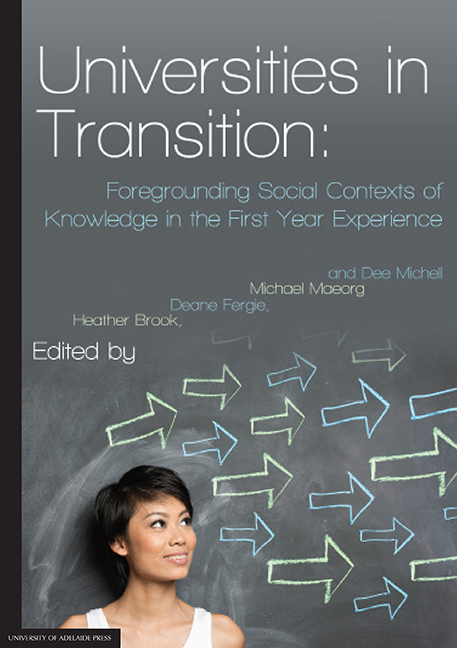Book contents
- Frontmatter
- Contents
- Notes on Contributors
- Introduction
- Part 1 Reconceptualising: transition and universities
- Part 2 Revaluing: ‘non-traditional’ student groups in higher education
- 3 Classism on campus? Exploring and extending understandings of social class in the contemporary higher education debate
- 4 Reframing ‘the problem’: students from low socio-economic status backgrounds transitioning to university
- 5 Changing social relations in higher education: the first-year international student and the ‘Chinese learner’ in Australia
- 6 Relating experiences: Regional and Remote students in their first year at university
- Part 3 Realising: transformations on campus
3 - Classism on campus? Exploring and extending understandings of social class in the contemporary higher education debate
from Part 2 - Revaluing: ‘non-traditional’ student groups in higher education
Published online by Cambridge University Press: 05 December 2014
- Frontmatter
- Contents
- Notes on Contributors
- Introduction
- Part 1 Reconceptualising: transition and universities
- Part 2 Revaluing: ‘non-traditional’ student groups in higher education
- 3 Classism on campus? Exploring and extending understandings of social class in the contemporary higher education debate
- 4 Reframing ‘the problem’: students from low socio-economic status backgrounds transitioning to university
- 5 Changing social relations in higher education: the first-year international student and the ‘Chinese learner’ in Australia
- 6 Relating experiences: Regional and Remote students in their first year at university
- Part 3 Realising: transformations on campus
Summary
Abstract
In this chapter we introduce the term ‘classism’ into the higher education debate in Australia. By ‘classism’ we mean the tendency to construct people from low socioeconomic status (SES) backgrounds as inherently deficient according to prevailing normative values. Using an analysis of the Bradley Review, we show that low SES students are constructed as inherently lacking in aspirations in current policy discourse and are regarded as ‘needier’ higher education students in comparison with their higher SES peers. This construction, we argue, is an example of classism, and therefore we suggest that adding ‘classism’ to existing understandings of disadvantage will help to raise awareness of discrimination as well as formulate best practice in higher education.
Introduction
On gaining office in 2007 the Labor government (2007-13) commissioned a comprehensive review of the higher education sector. Released in 2008 and known after its lead author, Professor Denise Bradley, ‘the Bradley Review’ (Bradley et al., 2008) identifies diversity and equity as key areas of concern in the sector. Consequently, the issue of equity in the Australian university system has re-emerged as a point of lively policy and public debate. Taking the Bradley Review as our starting point, in this chapter we examine the ways in which equity goals, as they relate to social class and socio-economic status (SES), are articulated in contemporary government policy.
- Type
- Chapter
- Information
- Universities in TransitionForegrounding Social Contexts of Knowledge in the First Year Experience, pp. 77 - 96Publisher: The University of Adelaide PressPrint publication year: 2014



